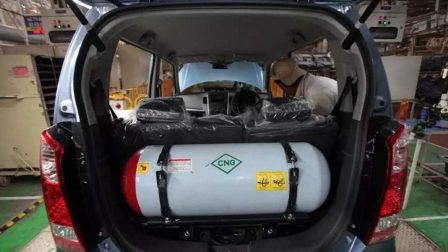As part of efforts to achieve deep penetration of gas powered vehicles in Nigeria, National Automotive Design and Development Council (NADDC) is engaging world class Original Equipment Manufacturers (OEM) to train local manpower and manufacturers of conversion kits for best CNG conversion solutions.
NADDC Director General, Mr Joseph Osannipin disclosed this recently while delivering a speech as the Special Guest of Honour at the Nigeria Auto Journalists Association (NAJA) Training/Capacity Building Workshop held in Lagos.
Themed “CNG/LPG/EV initiative: Challenges, Sustainability, Opportunities, Alternatives to Fossil Fuels in Nigeria” to propagate the CNG initiative of the Federal Government, the capacity building was aimed at equipping motoring journalists with necessary reportorial skills on the CNG conversion programme as it relates to the automotive industry
Osannipin said, ‘’President Bola Ahmed Tinubu established the Presidential Initiative on Compressed Natural Gas in furtherance of is commitment to easing the impact of fuel subsidy removal on Nigerians by reducing energy costs.
According to him, ‘among the objectives of the transformative initiative is promoting innovative ways of bringing the transition to CNG as an alternative energy source. The emergence of CNG as an alternative to petrol is the direct result of government’s policies to address energy-security and environmental concerns.
‘’NADDC, being the foremost agency in charge of the Automotive Industry is already playing leading roles in the implementation of the programmes. This is because of the critical roles the Council plays in the industry in the areas of technical know-how and expertise.
The DG, who was represented by Assistant Director, Press &Protocol, Ikechukwu Okoha, said, ‘’the agency has also collaborated with experts in conversion technology to develop the National Occupational Standards (NOS) for Conversion, Calibration and Maintenance of Autogas-Powered Vehicles (CNG/LPG/LNG) as one of the ways of achieving deep penetration of CNG vehicles.
He said: ‘’NOS has been validated by industry practitioners and approved by the regulatory authority, National Board for Technical Education (NBTE). The NOS would be used to train auto technicians on the conversion, repair and maintenance of gas-powered vehicles.
‘’In order to encourage the conversion of vehicles, Council proposed zero duty for conversion kits in the auto policy. To further demonstrate the safety of gas-powered vehicles, Council has converted some of its vehicles to use CNG. Some locally assembled gas-powered have also been procured by the Council.
‘’We have Carried out stakeholder’s workshop on accreditation of Compressed Natural Gas (CNG) conversion workshops in Nigeria, coordinated National Conference on Harnessing Youth Potentials and Career Prospects within the Nigerian Automotive Sector.
Osannipin said, the agency is coordinating the processes of accrediting and licensing CNG conversion workshops across the country. About 30 workshops have been licensed for CNG conversion.
‘’To ensure skills development and international best practices in the automotive sector of the country,’’ the NADDC boss added, “the Council conceived the establishment of Automotive Training Centres (ATCs) across the six geo- political zones aimed at redefining the nation’s auto industry, job provision and improvement in skills among technicians.
‘’This will in turn ensure prompt and efficient repair and maintenance of vehicles, while ensuring the safety of the mechanics, the vehicles and environment. A total of twenty-One (21) is being built by the Council. Many of the projects have been completed and are currently being equipped with state-of- the- art equipment by the original equipment manufacturer (OEM). The ATCs will also serve as CNG conversion centres when operational,’’ he said.
©Copyright MOTORING WORLD INTERNATIONAL. All rights reserved. Materials, photographs, illustrations and other digital content on this website, may not be reproduced, published, broadcast, rewritten or redistributed in whole or in part without prior written permission from Motoring World International
Contact: editor@motoringworldng.com





